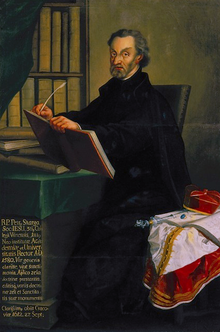Piotr Skarga
| Piotr Skarga Jesuit |
|
|---|---|

Anonymous 17th-century portrait
|
|
| Born |
2 February 1536 Grójec, Kingdom of Poland |
| Died | 27 September 1612 (aged 76) Kraków, Polish-Lithuanian Commonwealth |
| Other names | Piotr Powęski |
Piotr Skarga (less often, Piotr Powęski; 2 February 1536 – 27 September 1612) was a Polish Jesuit, preacher, hagiographer, polemicist, and leading figure of the Counter-Reformation in the Polish-Lithuanian Commonwealth. Due to his oratorical gifts, he has been called "the Polish Bossuet".
Skarga is remembered by Poles as a vigorous early advocate of reforms to the Polish-Lithuanian polity, and as a critic of the Commonwealth's governing classes, as well as of its religious tolerance policies. He advocated strengthening the monarch's power at the expense of parliament (the Sejm) and of the nobility (the szlachta).
He was a professor at the Kraków Academy and in 1579 he became the first rector of the Wilno Academy. Later, he served in the Jesuit College at Kraków. He was also a prolific writer, and his Lives of the Saints (Żywoty świętych, 1579) was for several centuries one of the most popular books in the Polish language. His other important work was the Sejm Sermons (Kazania Sejmowe, 1597), a political treatise, which became popular in the second half of the 19th century, when he was seen as the "patriotic seer" who predicted the partitions of Poland.
Skarga was born on 2 February 1536, north of Grójec, in the small folwark (manor) of Powęszczyzna (also known as Skargowzczyzna or Skargowo). His family are often described as lesser landless szlachta (gentry, or nobility), but it seems likely most of his ancestors had been peasants, later townsfolk who had only recently become minor nobility. He was reared at the family estate, and lost his parents when he was young; his mother died when he was eight years old, and his father, Michał Skarga, four years later. Thereafter he was supported by his brothers, one of whom, Stanisław Skarga, was a priest. Piotr started his education at a parochial school in Grójec before moving to Kraków, where in 1552 he enrolled at the Kraków Academy, precursor to Jagiellonian University. His teachers included the priests Marcin Glicjusz and Jan Leopolida. He finished his studies in 1555.
...
Wikipedia
